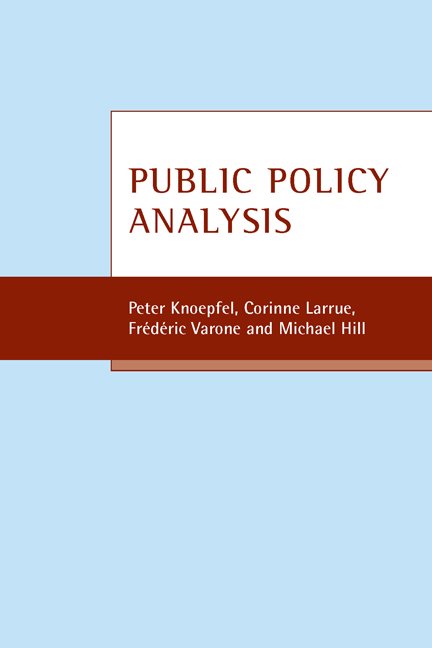four - Policy resources
Published online by Cambridge University Press: 14 January 2022
Summary
In this chapter, we present the resources that motivate public and private actors to assert their values and interests in the course of the different stages in the policy life cycle. In the traditional policy analyses, resources are generally considered as specific elements of political-administrative programmes (PAPs), or as means of action specific to actors’ efforts to resolve a collective problem.
In reality, a policy is not created or realised in a void. From the outset, the available resources exert a significant influence on the intermediate and final results of a policy. Even before the first intervention plans have been drafted, civil servants, politicians and private actors already see themselves as confronted with the ‘conditions of production’ for a proposed public action; they find themselves situated on a ‘building site’ with limited but necessary resources for the structuring and ‘construction’ of a public policy.
Until recently, the only policy resources considered by analysts were the law (legal and regulative bases), money and personnel. However, research carried out in recent years by representatives of the administrative sciences working in the area of organisational sociology, human resources and information systems shows that information, organisation, public infrastructure, time and consensus can also be considered as resources employed by policy actors. Political scientists also stress the importance of the political support or power that can be mobilised as a resource by different actors.
The availability of different resources to the actors involved in a policy process, their production, management, exploitation, combination, and even their substitution or exchange, can exert a significant influence on the processes, results and effects of a policy. In a number of variants of the New Public Management model the distribution and ‘management’ of resources at the disposal of policy actors is seen as a matter of choice for the executive. This approach involves treating such important resources as, for example, organisation, consensus, time as the sole responsibility of executive bodies and aims to limit the influence of parliament. Decisions about these have political elements; hence this approach may undermine democracy (Knoepfel, 1996, 1997b). As we shall demonstrate in this chapter, in our opinion, it is an excessively narrow vision of the role of policy resources and their influence on the quality of policy implementation and its effects.
- Type
- Chapter
- Information
- Public Policy Analysis , pp. 63 - 90Publisher: Bristol University PressPrint publication year: 2007

